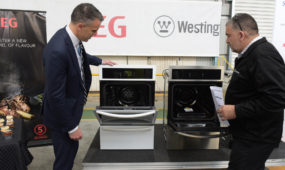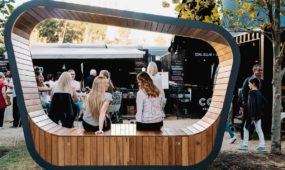Coopers are the kings of craft Down Under
Manufacturing
A MAJOR Australian brewer is finding gold at both ends of the craft beer rainbow by boosting sales of its commercial beers while cementing its position as the world’s biggest manufacturer and exporter of home brewing extracts.

Sign up to receive notifications about new stories in this category.
Thank you for subscribing to story notifications.
Coopers Brewery, which was established by Thomas Cooper in Adelaide, South Australia in 1862, is the largest Australian-owned brewery, accounting for about 5 per cent of the nation’s commercial beer market.
Coopers sold a record 80.7 million litres in 2015, a 4.4 per cent increase on 2014, fuelled by strong sales of its three top sellers – Coopers Original Pale Ale, Sparkling Ale and Mild Ale 3.5%. All three beers are secondary fermented in the bottle or keg.
But it is the home brew side of the business that kept the brewery going through the tough years of the 1970s and ’80s when Australia’s thirst for lagers boomed at the expense of traditionally brewed ales like Coopers.
The family-owned company began making malt syrups and other products through to full brewing kits shortly after Australian Prime Minister Gough Whitlam legalised home brewing in 1973.
Coopers Brewing Products Marketing Manager Scott Harris said Max Cooper, who ran the brewery at the time, saw an opportunity to turn the business around.
“The brewery was struggling so they got into home brew and home brew took off and it actually saved the brewery back in the ’80s,” Harris said.
Coopers then came up with a low temperature evaporation method that allowed it to package the malt syrup in cans and ship it all around the world and also into supermarkets.
“Home brew for us has never been a sideline, it’s always been a core product and we’ve kept it going and made sure we have maintained our position,” Harris said.
The worldwide explosion of craft beer and the slump in Australian consumption — Australia’s total beer consumption fell by almost 7 per cent between 2009-2014 — has hurt many breweries but Harris said Coopers had increased sales every year for the past 22 years.
“There were only about 12 micro breweries in Australia eight years ago, now we have over 350. That’s (happening) worldwide – there’s 400 in Poland, 600 in Italy and there’s 4000 in America and two more are opening a day so what that means is people are becoming much more educated about beers,” he said.
Harris said that far from hurting sales, the craft movement helps Coopers because it educates consumers on different types of beer.
“If you went back quite a few years people would say ‘I don’t get what goes on with Coopers, there’s stuff floating around in the bottle and it tastes funny’ because they were used to just drinking lagers,” Harris said.
“Ten years ago people would go in and buy a slab, now they walk in and they buy four different six-packs because they want to try different beers – they understand beer more like they understand wine.
“On the home brew side it’s actually been good too because now we’ve got people who actually want to make these craft beers – the ultimate craft beer is the one you make yourself.”
Harris said Coopers’ experience with home brew, which accounts for about 30 per cent of the company’s volume, helped to legitimise its interest in beer and, in particular, craft beer.
“Now what’s happened is there’s more and more people trying different styles of beer so they’re looking for genuine breweries that have been around for 150 years and have kept the same brewing style and have stuck to their guns. You get a lot of craft brewers saying ‘Coopers are one of the original craft brewers’.
“It’s not exactly but our Pale Ale and Sparkling Ale are a bit like a big home brew so we understood initial and secondary fermentation and bottle conditioning quite well from the commercial side so to move that across and get it right in a beer kit was quite important.”
While Coopers is available internationally, including some New York bars and Harrods of London, exports only account for about 2 per cent of commercial beer sales.
This month Coopers moves to its next phase in brewing with the launch of an automated home brewing system that uses Wi-Fi, precise temperature control and patented end of fermentation technology to brew beer at the push of a button.
The BrewArt system will be released in Australia in mid-July with a version expected to hit the United States market before the end of the year.
The brewing system, which has been likened to a Nespresso coffee machine, can be controlled from a smartphone app, which doubles as a stock inventory and ordering point for ingredients.
It is being aimed at tech savvy, time poor beer lovers who like the idea of brewing at home but have thought it to be time consuming, messy and something that took up a lot of space.
Harris said market research found that there were a lot of beer lovers interested in brewing who didn’t have the time, the space and thought there was too much cleaning involved.
“We didn’t bring it out for current home brewers, this is really about how do we get those other people who said they like the idea of brewing but just don’t do it,” he said.
“If you look at our current home brew market, the guys who used to go in to spend the lowest amount of money possible to just make cheap booze are literally dying off and the new guys coming through are quite happy to spend more to make a better beer. It’s still cost effective but that’s not the driving factor.
The BrewArt system, which comprises a BeerDroid for making the beer and a BeerFlo for chilling and serving it will be available for AU$799 and $699 from Australian retail chain Harvey Norman from July 18. Ingredients packs, known as BrewPrints range from $28 to $44 to make 10 litres.
“Most of this product is available only online and we have deliberately done it that way because the sort of people we are trying to approach are the people who want to order things online and have it delivered in two days,” Harris said.
“We will set up different distribution centres in each country we go to – it’s easier for us in America as our next step because we already own a company there.
“Then we’ll go to other markets and the UK is the next logical one.”
Jump to next article



